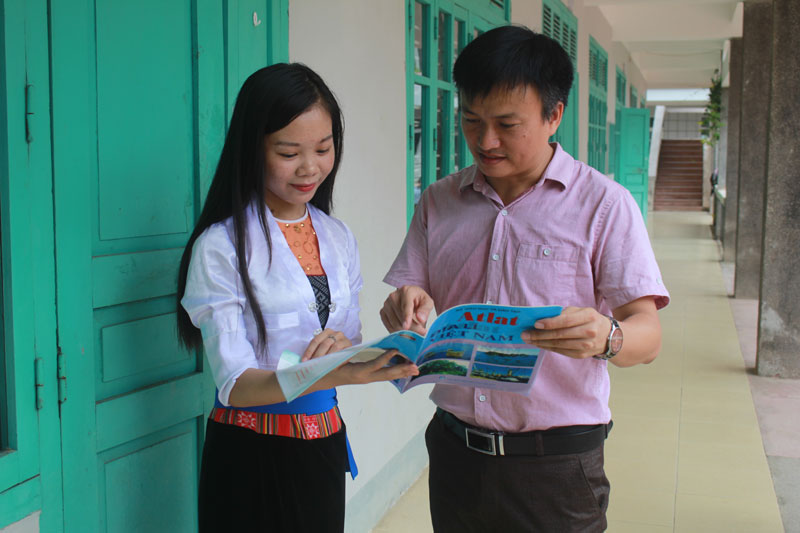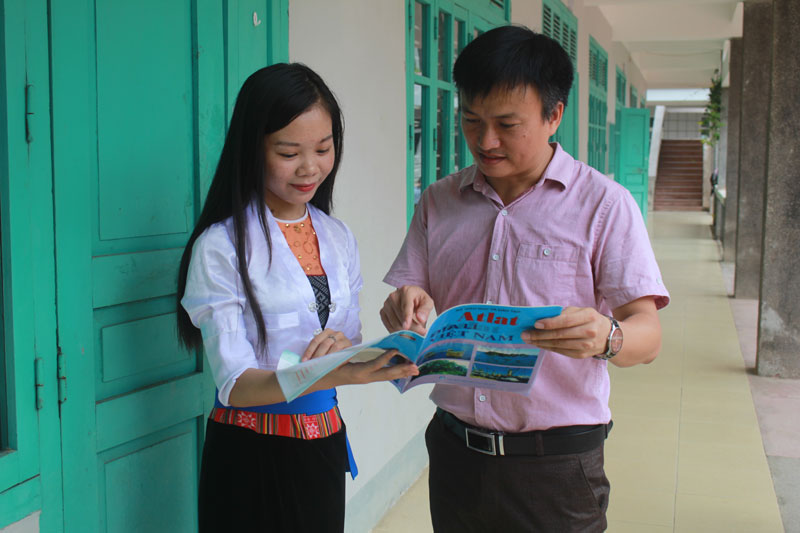
(HBO) – The one we want to talk about is Ha Hai Yen, a student of class 12B (2014 – 2017 term) at the Ethnic Boarding School of Hoa Binh province. She was the monitor for three years at the high school with outstanding academic achievements.
Ha Hai Yen, student of class 12B (2014 – 2017
term) at the
Ethnic
Boarding School of Hoa
Binh province, has always set a good example in all activities at school.
Yen is the oldest child in a family with two
girls in Bach 2 hamlet, Lung Van commune, Tan Lac district. Her mother is a
teacher at Lung Van primary and junior high school, and her father works at
Quyet Chien primary and junior high school. Yen had to stay with her grandparents,
away from her home when she went to the first grade at the primary school in
Dich Giao commune. Then, she studied at the Ethnic Boarding School of Tan Lac
district. At the school, she learnt about and nurture her dream of studying at the
Ethnic Boarding School of Hoa Binh province, where President Ho Chi Minh visited.
She tried her best and passed an entrance exam in 2014. With 39.25 points, she
ranked second in the class for gifted students in literature.
With the motto "Keep trying the best, never
regret”, she was an excellent students for all three senior high-school years with
the point average of 8.5 and above in all six semesters. Being selected for the
school’s gifted team in geography, Yen studied hard and won first and second
prizes at the provincial contests for gifted students in geography at Grades 11
and 12, respectively.
She was honoured for her outstanding academic
achievements by the provincial Department of Education and Training twice. At
the high school graduation examination, she scored 31 (including bonus point) and
was admitted into the Orientalism Faculty of the University of Social Sciences
and Humanities, in which she scored
10 in geography. "Now I have a chance to
realise my dream of getting a scholarship to
Japan”, Yen said excitingly.
She underlined the need for self-study, saying
that she listened carefully to her teachers at schools, and studied from 7 – 11
pm and woke up at 5am to study at home.
Yen also actively joined extracurricular
activities at schools. She helped two friends, who had no good academic
performance in her class, improve in their studies and be admitted into
universities.
According to Yen, she gained life skills and confidence
from collective
The emulation movement "Hoa Binh joining hands to build new-style rural areas” has been widely spreading, becoming a driving force that motivates the localities to renew rural landscapes and improve the material and spiritual lives of the residents. In this movement, the people play a central role-both as the main implementers and direct beneficiaries of its outcomes.
In response to the global digital revolution, Hoa Binh Newspaper is transforming itself into a modern and multi-platform media hub, blending cutting-edge technology with a restructured newsroom and a new generation of tech-savvy journalists.
Hoa Binh province’s Association of the Elderly recently held a conference to review the project on expanding the inter-generation self-help club model until 2025.
In a move to implement Resolution No. 57-NQ/TW, issued on December 22, 2024 by the Politburo, which targets breakthroughs in science-technology development, innovation, and digital transformation, the Hoa Binh provincial Department of Health has issued a plan to roll out the "Digital Literacy for All” campaign within the local health sector.
An Nghia Commune (Lạc Sơn District) is one of the communes that achieved the tha standard of the national new rural area in 2018. Entering a new development phase, the commune is now trying to meet the criteria for the advanced new rural development. With the strong political will and the public consensus, the commune is gradually overcoming the challenges to reach this goal, aiming for the sustainable development.



